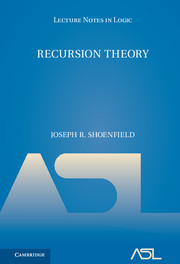Book contents
- Frontmatter
- Introduction
- Contents
- 1 Computability
- 2 Functions and Relations
- 3 The Basic Machine
- 4 Macros
- 5 Closure Properties
- 6 Definitions of Recursive Functions
- 7 Codes
- 8 Indices
- 9 Church's Thesis
- 10 Word Problems
- 11 Undecidable Theories
- 12 Relative Recursion
- 13 The Arithmetical Hierarchy
- 14 Recursively Enumerable Relations
- 15 Degrees
- 16 Evaluation of Degrees
- 17 Large RE Sets
- 18 Functions of Reals
- 19 The Analytical Hierarchy
- 20 The Projective Hierarchy
- Suggestions for Further Reading
- Index
9 - Church's Thesis
Published online by Cambridge University Press: 24 March 2017
- Frontmatter
- Introduction
- Contents
- 1 Computability
- 2 Functions and Relations
- 3 The Basic Machine
- 4 Macros
- 5 Closure Properties
- 6 Definitions of Recursive Functions
- 7 Codes
- 8 Indices
- 9 Church's Thesis
- 10 Word Problems
- 11 Undecidable Theories
- 12 Relative Recursion
- 13 The Arithmetical Hierarchy
- 14 Recursively Enumerable Relations
- 15 Degrees
- 16 Evaluation of Degrees
- 17 Large RE Sets
- 18 Functions of Reals
- 19 The Analytical Hierarchy
- 20 The Projective Hierarchy
- Suggestions for Further Reading
- Index
Summary
We have already remarked that it is clear that every recursive function is computable. The statement that every computable function is recursive is known as Church's Thesis. It was proposed by Church about 1934 and has since come to be accepted by almost all logicians. We shall discuss the reasons for this.
Since the notion of a computable function has not been defined precisely, it may seem that it is impossible to give a proof of Church's Thesis. However, this is not necessarily the case. We understand the notion of a computable function well enough to make some statements about it. In other words, we can write down some axioms about computable functions which most people would agree are evidently true. It might be possible to prove Church's Thesis from such axioms. However, despite strenuous efforts, no one has succeeded in doing this (although some interesting partial results have been obtained).
We are thus reduced to trying to give arguments for Church's Thesis which seem to be convincing. We shall briefly examine these arguments.
The first argument is that all the computable functions which have been produced have been shown to be recursive, using, for the most part, the techniques which we have already described. Moreover, all the known techniques for producing new computable functions from old ones (such as definition by induction or by cases) have been shown to lead from recursive functions to recursive functions.
Another argument comes from various attempts to define computable precisely. We have seen two of these: the definition by means of the basic machine and the definition by means of recursively closed classes (see Proposition 8.3). There are many others, some similar to these two and some quite different. In every case, it has been proved that the class of functions so defined is exactly the class of recursive functions. This at least shows that the class of recursive functions is a very natural class; and it is hard to see why this should be so unless it is indeed the class of computable functions.
- Type
- Chapter
- Information
- Recursion Theory , pp. 26 - 28Publisher: Cambridge University PressPrint publication year: 2017



